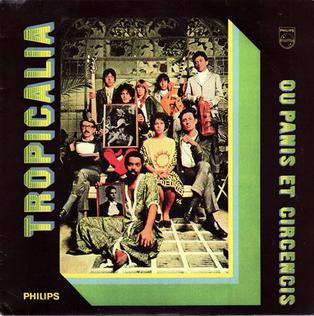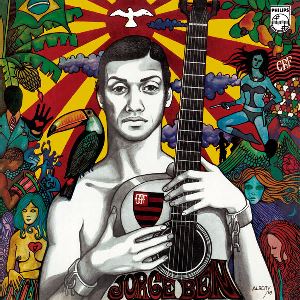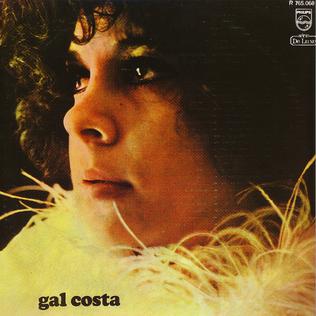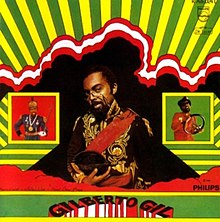
Caetano Emanuel Viana Teles Veloso is a Brazilian composer, singer, guitarist, writer, and political activist. Veloso first became known for his participation in the Brazilian musical movement Tropicalismo, which encompassed theatre, poetry and music in the 1960s, at the beginning of the Brazilian military dictatorship that took power in 1964. He has remained a constant creative influence and best-selling performing artist and composer ever since. Veloso has won nine Latin Grammy Awards and two Grammy Awards. On November 14, 2012, Veloso was honored as the Latin Recording Academy Person of the Year.

Os Mutantes are an influential Brazilian rock band that were linked with the Tropicália movement, a dissident musical movement during the Brazilian dictatorship of the late 1960s. The band is considered to be one of the main groups of Brazilian rock. Heavily influenced by Anglo-American psychedelic pop, they bridged Brazilian sensibilities together with studio trickery, feedback, distortion, and musique concrète. They released their now-acclaimed self-titled debut album in 1968.
Tropicália, also known as Tropicalismo, was a Brazilian artistic movement that arose in the late 1960s. It was characterized by the amalgamation of Brazilian genres—notably the union of the popular and the avant-garde, as well as the melding of Brazilian tradition and foreign traditions and styles. Today, Tropicália is chiefly associated with the musical faction of the movement, which merged Brazilian and African rhythms with British and American psychedelia and pop rock. The movement also included works of film, theatre, and poetry.

Rita Lee Jones is a Brazilian rock singer, composer and writer. She is a former member of the Brazilian band Os Mutantes and is a popular figure in Brazilian entertainment, where she is also known for being an animal rights activist and a vegan. She has sold more than 55 million records worldwide. Her autobiography Rita Lee: Uma Autobiografia was the best-selling non-fiction book of 2017 in Brazil.

Gal Maria da Graça Costa Penna Burgos, known professionally as Gal Costa, was a Brazilian singer of popular music. She was one of the main figures of the tropicalia music scene in Brazil in the late 1960s and appeared on the acclaimed compilation Tropicália: ou Panis et Circenses (1968).
Loki? is the first solo album from Arnaldo Baptista, the keyboardist, bassist and singer of the Brazilian band Os Mutantes. It was released in 1974 after a supposed nervous breakdown and it is considered one of the best albums in the 1970s Brazilian music scene. The album expresses his angst towards the height of post-modern society, along with the suffocating aspect of modernity: pollution, superpopulation, loneliness, etc.

Os Mutantes is the debut album by the Brazilian tropicalia band Os Mutantes. It was originally released in 1968 by Polydor and blends traditional Brazilian music styles with American and British psychedelia. The album includes a cover of The Mamas & The Papas' "Once Was a Time I Thought", translated into "Tempo no Tempo", and a cover of "Le premier bonheur du jour", previously recorded by Françoise Hardy. It was reissued in 1999 on Omplatten Records and again in 2006 by Omplatten's parent company, Universal Records.

Mutantes (transl. Mutants) is the second album by the Brazilian tropicalia band Os Mutantes. The album was originally released in 1969 and reissued in 1999 on Omplatten Records and again in 2006 by Omplatten's parent company, Universal Records. It shows a more polished approach than their first album, maintaining the sense of humour while keeping the experimental aspects, such as fusing different genres, studio trickery as well as using found objects and samples from television and movies.
Rogério Duprat was a Brazilian composer and musician.

A Divina Comédia ou Ando Meio Desligado is the third album by the Brazilian rock band Os Mutantes. The album was originally released in 1970 and reissued in 1999 on Omplatten Records and again in 2006 by Omplatten's parent company, Universal Records. The title in English means: The Divine Comedy or I Am a Bit Disconnected. "I am a bit disconnected" in this sense means "I feel a little spaced out." The second track features the band imitating California accents. The album as a whole is characterized by a mix of psychedelic and religious imagery.

Jardim Elétrico is the fourth album by the Brazilian Tropicália/psychedelic rock band Os Mutantes. The album was originally released in 1971 on Polydor Records. The title in English means Electric Garden. Five of the songs from this album were originally intended to be released on the album Tecnicolor, but that album was not released until 2000.

Tropicália ou Panis et Circencis is a 1968 collaboration album by artists including Gilberto Gil, Caetano Veloso, Tom Zé, Os Mutantes and Gal Costa. Considered an important record in the Tropicália movement and in the history of Brazilian music, it features orchestral arrangements by Rogerio Duprat and lyrical contributions from Torquato Neto.

Caetano Veloso is an album released in Brazil in 1969, being the third album by Caetano Veloso, his second solo.

Doces Bárbaros is a 1976 album by the Música popular brasileira supergroup of the same name. It was recorded June 24 of that year at Anhembi Stadium in São Paulo. Its members were Gilberto Gil, Caetano Veloso, Maria Bethânia and Gal Costa, four of the biggest names in the history of the music of Brazil. The band was the subject of a 1977 documentary directed by Jom Tob Azulay. In 1994, they performed a tribute concert to Mangueira school of samba.

Gil e Jorge is a 1975 album featuring collaboration between Brazilian musicians Jorge Ben and Gilberto Gil. The two perform together alongside percussionist Djalma Corrêa on each of the songs, improvising and interacting directly throughout. The album was released in Brazil under the title "Ogum Xangô" with a different cover.

Jorge Ben is the sixth studio album by Brazilian singer-songwriter and guitarist Jorge Ben. It was released in November 1969 by Philips Records. The album was his first recording for a major label since 1965 when his first stint with Philips ended due to creative differences.

Gilberto Gil is the third solo album by Gilberto Gil, originally released in 1969. The album was arranged by Rogério Duprat, and has a strong element of psychedelic rock to it, being considered by some to be his most experimental album. Since Gil was not allowed by the Brazilian military dictatorship to leave Salvador, Bahia, before being exiled to London, he recorded vocals and acoustic guitar in Salvador, and Rogério Duprat recorded the other instruments in Rio de Janeiro and São Paulo.

Gal Costa is the first solo album by the Brazilian singer Gal Costa, released in 1969. It was ranked the 80th best Brazilian album of all time by the Brazilian Rolling Stone magazine.

Expresso 2222 is the fifth studio album by Brazilian artist Gilberto Gil, released in June 1972 by Philips Records. In October 2007, the magazine Rolling Stone's Brazilian edition published a list of the 100 Greatest Albums of Brazilian Music, in which Expresso 2222 featured at number 26.
Psychedelic rock in Latin America is the psychedelic rock music scene in Latin America.















